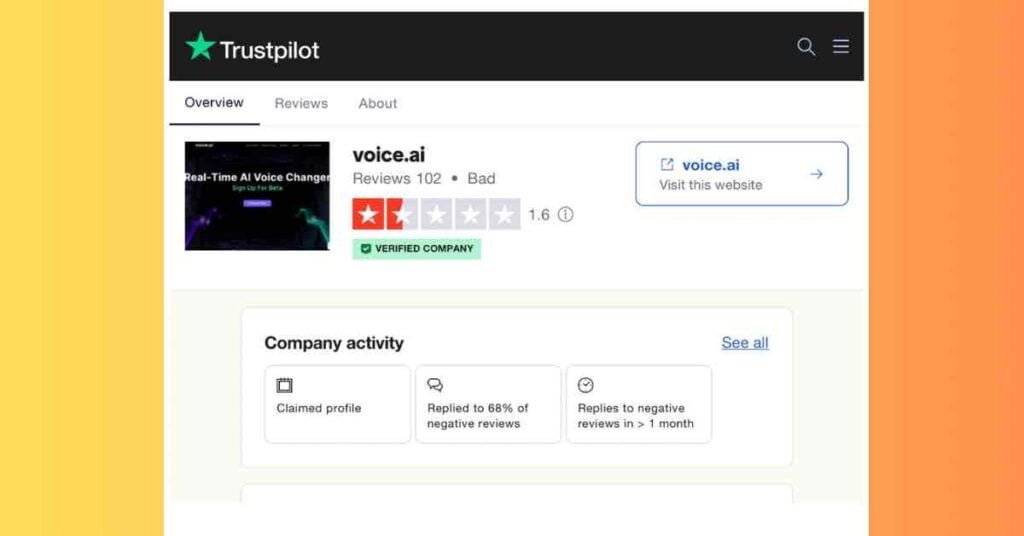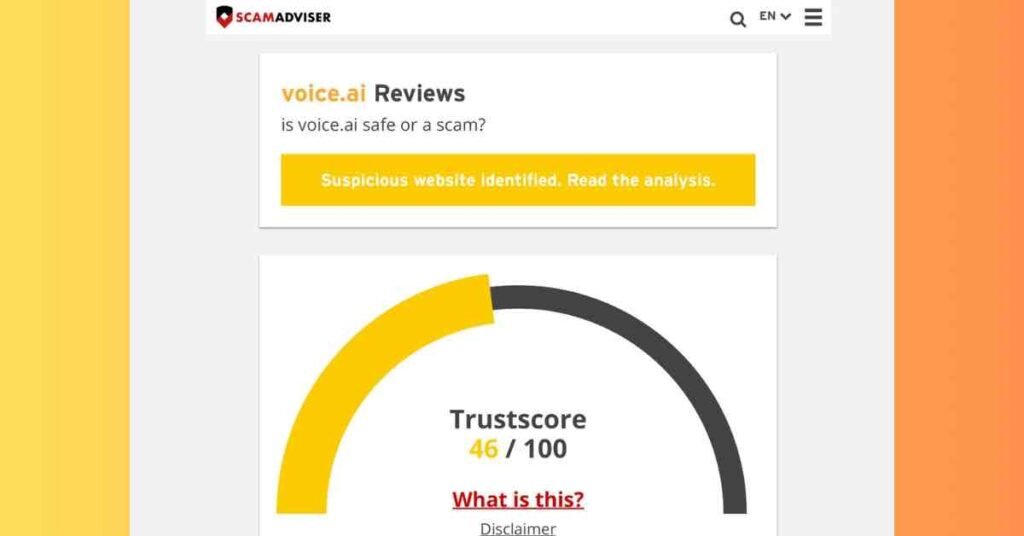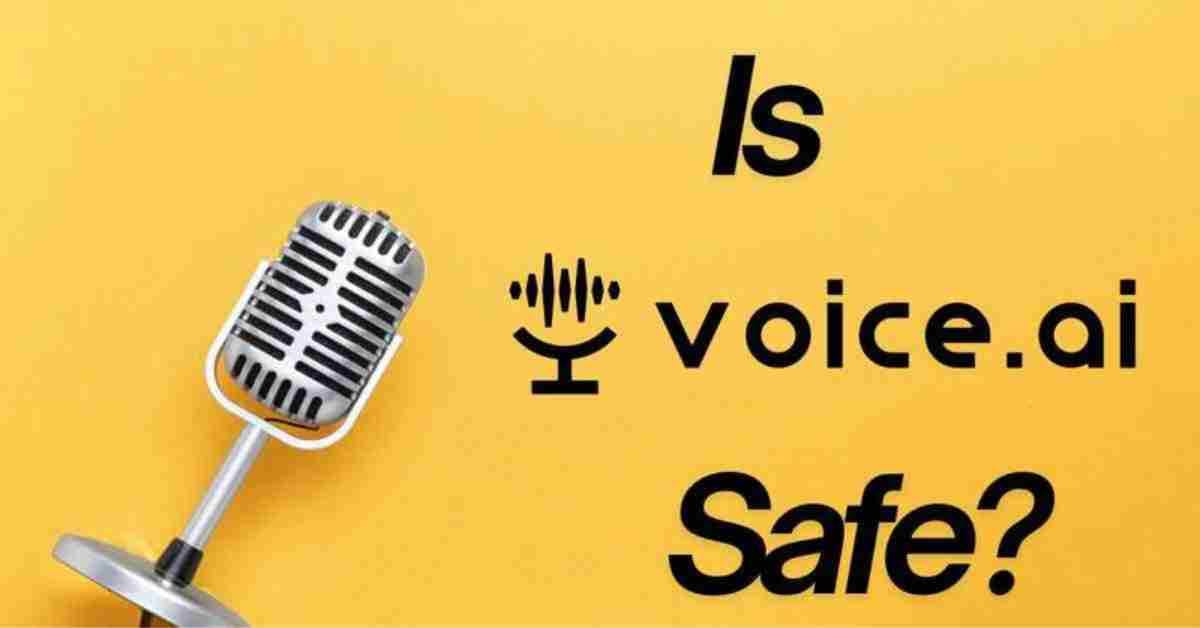In an era where digital privacy concerns are at an all-time high, the safety of AI-powered voice technologies has become a pressing question for many users.
As voice AI applications continue to proliferate, people are increasingly wondering: Is Voice.ai safe? This concern is not unfounded, given the sensitive nature of voice data and the potential risks associated with AI technologies.
However, understanding the safety measures, features, and potential vulnerabilities of Voice.ai can help users make informed decisions about its use.
In this comprehensive guide, we’ll delve into the world of Voice.ai, exploring its security features, privacy considerations, and overall safety.
Note: This article includes AI-generated sections for accuracy, all reviewed and edited by human experts.
Key-Points
What is Voice.ai?

Voice.ai is an advanced voice changer and AI-powered voice synthesis platform that has gained significant attention in recent years. This technology allows users to alter their voices in real time or create entirely new voices using Artificial Intelligence (AI).
Voice AI, as a broader concept, encompasses a range of applications that use machine learning algorithms to process, analyze, and generate human-like speech.
Key features of Voice.ai include:
- Real-time voice modification
- AI-driven voice synthesis
- Multiple voice presets and customization options
- Cross-platform compatibility (PC, mobile devices)
- Integration with various communication apps
Voice.ai works by analyzing input audio and applying complex algorithms to modify or generate speech. This technology has found applications in various fields, including entertainment, content creation, privacy protection, and accessibility services.
As Voice.ai is free to use in its basic form, it has attracted a wide user base curious about its capabilities and potential uses.
The Importance of AI Safety in Voice Technology
As AI applications become more prevalent in our daily lives, the importance of AI safety cannot be overstated. Voice AI technologies, in particular, present unique challenges and concerns due to the personal nature of voice data. Users rightfully question whether AI apps are safe and how their voice data might be used or potentially misused.
Key considerations in AI safety for voice technology include:
- Data privacy and protection
- Potential for voice cloning and impersonation
- Ethical use of AI-generated voices
- Compliance with regulations and industry standards
Voice.ai, like other AI applications, must address these concerns to be considered safe and trustworthy. As we explore the safety features and potential risks associated with Voice.ai, it’s crucial to keep these broader AI safety considerations in mind.
Is Voice.ai safe?
Contrary to what some may believe, Voice.ai is not safe. There are significant concerns regarding its security, privacy practices, and overall trustworthiness. Let’s examine some key indicators that highlight the potential dangers of using Voice.ai.
Trustpilot Reviews Paint a Concerning Picture
On Trustpilot, a well-known platform for user reviews, Voice.ai has received a staggeringly low rating of 1.6 out of 5 stars. This alarmingly poor score is a clear indication that many users have had negative experiences with the platform.

Such a low rating suggests serious issues with the service, potentially including security breaches, privacy violations, or other safety concerns. This feedback from actual users should serve as a red flag for anyone considering using Voice.ai.
Scam Adviser Raises Serious Doubts
Further compounding the safety concerns, Scam Adviser, a website dedicated to evaluating the legitimacy of online services, has given Voice.ai a trust score of just 46 out of 100. This extremely low score is a strong indicator that Voice.ai may not be a legitimate or trustworthy service.

Such a poor rating from a reputable source like Scam Adviser suggests that users should be extremely cautious about using Voice.ai, as it may pose significant risks to their personal data and online safety.
Privacy Considerations for Voice.ai Users
Given the concerns raised about Voice.ai’s safety, privacy considerations become even more critical. Users should be extremely cautious about the personal data they share with the platform.
Voice.ai’s privacy measures may include:
- Data collection and usage policies
- Options for users to control their data
- Compliance claims with data protection regulations
However, given the low trust scores and poor user reviews, it’s crucial to question the effectiveness and reliability of these measures. Users should be very wary of sharing any personal information or voice data with Voice.ai, as the risks may far outweigh any potential benefits.
Pros and Cons of Using Voice.ai
While Voice.ai may offer some innovative features, the significant safety and trust issues outweigh any potential benefits.
Pros:
- Voice changing and synthesis capabilities
- User-friendly interface
- The free basic version is available
Cons:
- Serious privacy concerns
- Potential for data misuse
- Poor user reviews and low trust scores
- Possible security vulnerabilities
- Risk of identity theft or fraud
Given these factors, the cons of using Voice.ai significantly outweigh any potential pros. Users should seriously reconsider using this platform and explore safer alternatives.
Potential Vulnerabilities and Mitigations
The low trust scores and poor user reviews suggest that Voice.ai may have significant vulnerabilities that put users at risk. These could include:
- Inadequate data protection measures
- Potential for unauthorized access to user accounts
- Possible misuse of voice data
- Vulnerabilities in integration with other apps
Given these risks, the best mitigation strategy is to avoid using Voice.ai altogether. If you have already used the service, consider:
- Deleting your account and any stored data
- Changing passwords on other accounts if you’ve used similar credentials
- Monitoring your online accounts for any suspicious activity
- Being cautious about any future use of voice AI technologies
Alternatives to Voice.ai
Given the safety concerns surrounding Voice.ai, it’s crucial to explore safer alternatives. Here are some options that may offer better security and user protection:
- Voicemod: A popular voice-changing software that offers real-time voice modification for gaming and streaming. It has a better reputation for security and user satisfaction.
- Clownfish Voice Changer: This free voice changer works with various communication apps and has received more positive user feedback regarding safety and functionality.
- MorphVOX: A professional voice-changing application that offers high-quality voice modification and has a strong track record for user privacy.
- VoiceFX: A mobile app for voice changing that provides various effects and has generally positive user reviews regarding safety and ease of use.
- Voxal Voice Changer: Known for its wide range of voice effects and generally positive user feedback on privacy practices.
When considering these alternatives, always research their privacy policies, user reviews, and security measures. While they may offer safer options than Voice.ai, it’s important to remain vigilant about protecting your personal data when using any voice AI technology.
Conclusion
In conclusion, the evidence strongly suggests that Voice.ai is not safe to use. The extremely low Trustpilot rating of 1.6 out of 5 stars, combined with the concerning trust score of 46/100 from Scam Adviser, paints a clear picture of a service that poses significant risks to its users.
These poor ratings, along with the potential vulnerabilities and privacy concerns we’ve discussed, make it advisable to avoid using Voice.ai. Instead of risking your personal data and online safety with Voice.ai, consider exploring the safer alternatives mentioned in this article.
Stay informed, read user reviews, and always be on the side of caution when it comes to your online security.
FAQs
1. Is Voice.ai completely safe to use?
No, Voice.ai is not considered safe to use. Low trust scores and poor user reviews indicate significant risks associated with the platform.
2. Can Voice.ai be used for malicious purposes?
Like many technologies, Voice.ai could potentially be misused. Given the safety concerns, there’s a higher risk of malicious use compared to more reputable alternatives.
3. Does Voice.ai store my voice recordings?
Voice.ai may store voice data, but given the safety concerns, it’s advisable not to trust the platform with any personal information, including voice recordings.
4. Is the free version of Voice.ai safe to use?
No version of Voice.ai, free or paid, can be considered safe based on the available information and user feedback.
5. How does Voice.ai compare to other voice AI apps in terms of safety?
Voice.ai appears to be significantly less safe than many other reputable voice AI apps. It’s advisable to choose alternatives with better safety records and user reviews.
